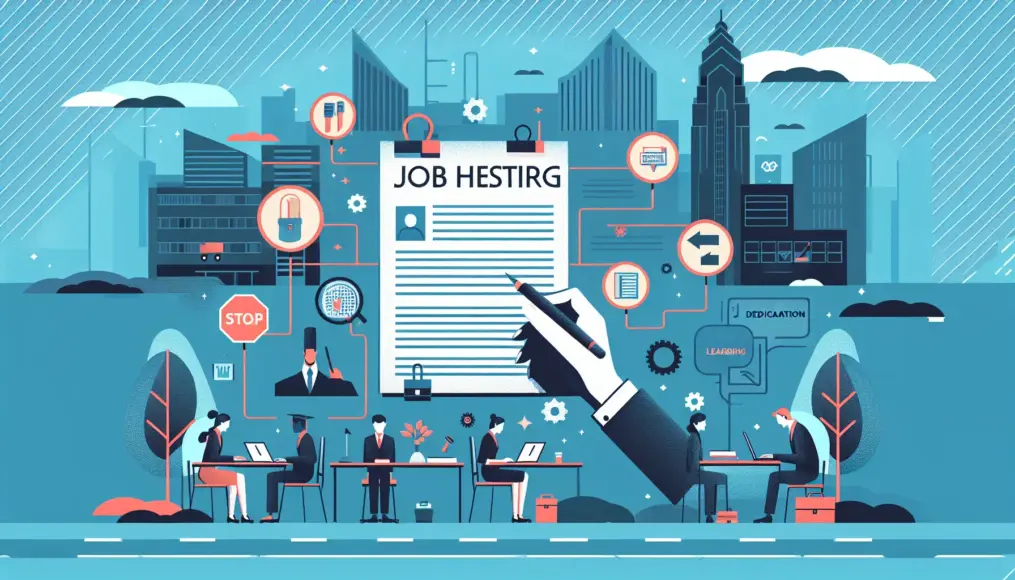When considering a career change, writing a compelling resume is crucial. A well-crafted resume serves as an effective means to showcase your experiences and skills.
In this article, we’ll explore everything from the fundamentals of resume writing to effective strategies and key points to keep in mind. Let’s master the art of creating a resume that will help you succeed in your job search.
- Understand the essential elements needed in a resume
- Discover how to effectively convey your strengths
- Learn important tips to keep in mind while writing your resume
Understanding the Essential Structure of a Resume
A resume is a crucial document in your job search.
When crafted correctly, it effectively showcases your experiences and skills.
Let’s dive into the essential elements that every resume should include, along with some tips for creating an eye-catching layout.
Key Components Every Resume Should Have
When writing your resume, it’s vital to cover the necessary components.
Typically, you’ll need to include your basic information, work history, skills and qualifications, and a personal statement.
By organizing and presenting this information clearly, you can effectively convey your strengths to potential employers.
Having a checklist of the required elements will help you write your resume smoothly.
- Clearly list your basic information (name, contact details, etc.)
- Present your work history in reverse chronological order
- Highlight your personal statement and skills with specific examples
Tips for an Attractive Layout
The layout of your resume is equally important.
A clean and readable design can leave a positive impression on hiring managers.
Make sure to provide adequate white space and maintain a consistent font size and style.
Also, consider placing key information in a way that draws the reader’s attention.
For more effective writing tips, check out The Key to Job Search Success! Complete Guide to Writing Your Work History.
- Use appropriate white space to enhance readability
- Maintain consistent font size and style
- Strategically position important information to make it stand out
How to Write an Effective Work History
A well-crafted work history is an essential tool for effectively showcasing your experiences and skills.
One of the key aspects is to express specific achievements and strengths in a compelling way.
In this section, we will delve into how to articulate your accomplishments and communicate your standout qualities in your work history.
Articulating Specific Achievements
When writing your work history, it’s crucial to go beyond simply listing your job duties—highlighting specific achievements is what truly matters.
For instance, using numbers and tangible results can clearly convey your contributions.
Examples like “Increased sales by 20%” or “Completed a project three months ahead of schedule” leave a strong impression on hiring managers.
When detailing your accomplishments, make sure to clearly outline what you did and the results that followed.
- Incorporate numbers and specific outcomes
- Clarify how you contributed
- Explain the impact you had on others
Communicating Your Standout Qualities
Your standout qualities are crucial for emphasizing your strengths.
Here, it’s important to specifically detail your skills and attributes.
For example, mentioning skills related to teamwork, leadership, or problem-solving is beneficial.
Including specific anecdotes can also add credibility to your claims.
If you want to learn more about this topic, check out our guide on Shining on Your Resume! How to Leverage Your Experience.
- Specify your skills and attributes
- Choose standout qualities relevant to the position
- Enhance credibility with anecdotes
Tips for Writing a Resume
When it comes to crafting your resume, there are a few key points to keep in mind.
Typos and readability issues can significantly impact the impression you leave on potential employers.
In this section, we’ll explore some effective strategies for creating a polished and professional resume.
How to Avoid Typos
Typos and errors can undermine your credibility on a resume. For this reason, it’s essential to proofread your document after writing it.
One effective strategy is to take a break before reviewing your resume again, as this can help you catch mistakes you might have otherwise overlooked.
Additionally, having someone else review your resume can provide valuable feedback.
- Take a break before proofreading
- Ask someone else to review it
- Use spell-check tools
Techniques to Improve Readability
To create a resume that is easy to read, pay attention to the layout and structure of your content.
Incorporating adequate white space and maintaining consistent font styles and sizes can enhance visual clarity.
Also, keep sentences concise to ensure that your information flows smoothly.
Make sure to highlight important points to draw attention to them.
For more on this topic, check out the guide on Keys to Success in Job Hunting! Effective Resume and Work History Writing.
- Use appropriate white space to enhance readability
- Aim for concise sentences
- Highlight important points
Leveraging Your Resume for a Successful Job Transition
A well-crafted resume is an essential tool for effectively navigating your job search. By utilizing this document wisely, you can enhance your interview preparation and make the most of the feedback you receive.
Here, we’ll discuss how to prepare for interviews using your resume and how to incorporate feedback to improve your job search.
Preparing for Interviews with Your Resume
When heading into an interview, it’s crucial to make good use of your resume. Prepare to discuss your experiences and skills in detail based on the information you’ve included.
For instance, practicing how to articulate your achievements specifically can leave a strong impression on your interviewer. Reviewing your resume also allows you to anticipate questions that may come up during the interview.
- Be ready to explain your achievements in detail
- Anticipate common questions and prepare answers
- Organize content you can confidently discuss
Making the Most of Feedback
Your resume is also vital for utilizing feedback you receive during your job search. You can improve your resume based on insights and evaluations from others.
For example, having friends or career advisors review your resume and offer advice can lead to a more compelling document. It’s important to embrace feedback and be flexible in making necessary adjustments.
For more detailed information on how to write resumes and the role of stamps, check out How to Write a Resume and the Role of Stamps! Key Points for Success.
- Incorporate feedback from others
- Enhance your resume based on their advice
- Approach revisions with an open and adaptable mindset
Conclusion
A well-crafted resume plays a crucial role in your job search journey.
By learning the right way to present your qualifications, you can effectively showcase your skills and experiences.
Take the insights from this article and create a resume that truly reflects who you are.
- Ensure you include all the essential information in your resume
- Clearly highlight specific achievements and key selling points
- Pay attention to readability and check for typos
Wishing you success in your job search!
We’d love to hear about your experiences and thoughts in the comments!



Comment